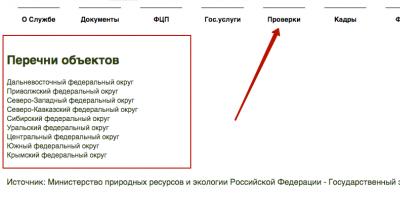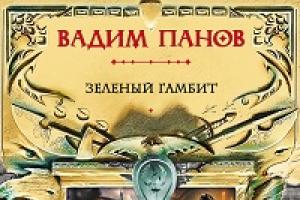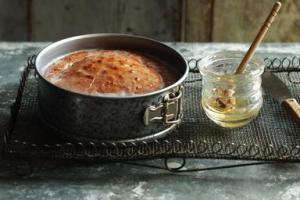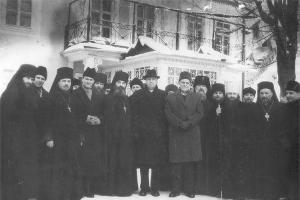On January 8, 2019, the people of Russia celebrate Babi porridge or Midwife Day. Other names for the holiday are also known. At this time, our ancestors went to visit the grandmothers who were delivering babies and thanked them for their hard and necessary work.
The day after the Feast of the Nativity of Christ, January 8 according to the new style, the Orthodox world celebrates an important holiday - the Council Holy Mother of God. On this day Orthodox Church with songs of praise and gratitude he addresses the Mother of God, who became the chosen instrument of Providence and gave birth to the Savior.
It is precisely because the Most Holy Virgin is the One from whom our Savior Jesus Christ was born and incarnate, and this holiday was established to honor her immediately after His Nativity.
This day is called a cathedral because, unlike individual holidays in honor of the Blessed Virgin Mary (for example, Her Conception, Nativity, Annunciation, etc.), on this day a general (conciliar) celebration of other persons close to the Blessed Virgin Mary and the Lord Jesus Christ takes place .
Thus, together with the Mother of God, the celebration of the Council also commemorates those who were close to the Savior in the flesh: Saint Joseph the Betrothed, King David (ancestor in the flesh of the Lord Jesus Christ) and Saint James (brother of the Lord, son from the first marriage of Saint Joseph the Betrothed ), who accompanied the Mother of God and the Infant Jesus with his father during their flight to Egypt.
Joseph the Betrothed, being an 80-year-old man, with the blessing of the high priest, accepted the Virgin Mary in order to preserve her virginity and purity. And although he was betrothed to the Most Pure One, his entire ministry was to protect the Mother of God. The Prophet David was in the flesh the ancestor of the Lord and Savior, because, as it should have been, the Savior, the Messiah, came into the world from the line of David. And the Apostle James is called the brother of God because he was the eldest son of Joseph the Betrothed - from his first marriage. Jacob was a very pious man and after the Resurrection of Christ he was elected primate of the Jerusalem Church.
Traditions for the holiday of Babin's porridge or Midwife's Day on January 8
The main traditions on January 8 are visiting midwives and presenting them with gifts; treating guests to porridge.
Traditionally, during Babi porridge people went to visit the midwives. They were brought various treats: pies, pancakes; presented gifts. According to legend, if a pregnant woman presents gifts to the midwife, her birth will be easy. The arriving guests were greeted with a special porridge: hearty and tasty, for which no milk, no butter, no cream was spared.
This is where the name of the holiday comes from. - Not a single birth was complete without a midwife. The grandmother helped the woman in labor. And she was, as they used to say, with her hands. Knowing the customs of the old days, the grandmother knew her business. In the throes of the woman in labor, she flooded the bathhouse and carried the woman in labor out into the sun. The babbling - the waving - was accomplished with a kind word, kind herbs, kind prayers.
By smoking the woman in labor, that is, by lighting a birch splinter and setting fire to wormwood with immortelle grass, the grandmother cared about easy homelands.
Even, not in such distant times, mother gathered the children in the evening and taught them to glorify Christmas, sprinkle it with grain - for a long life, for happiness, for well-being. It was as easy as shelling pears to give out a slice of pie at the holiday hour and pamper the children with cranberries and honey.
But mother knew: “Not every house bakes a loaf of bread, especially so that there is enough for the whole family.” And so the children had to earn a treat, the whole childish world had to taste equal parts of both food and sweets: “Give me a cow, a buttered head, a baked cow, a gilded cow!”
And from every house both the big women and the bride-maids carried ritual cookies, which in their appearance were akin to cattle, into a child’s box. And the kids egged me on: “You, mistress, give it to me!” You, sweetheart, give it to me! Serve - don't break! If you break it off a little, it will be Ermoshka. If you break off the top, it will be Andryushka. And if you serve the middle, there will be a wedding!” And so the childish box grew heavier.
And a crowd of praisers ran to someone’s heated bathhouse and shared the treat among themselves. It was a joyful time of games and fun. The children recognized each other and were childishly happy, remembering this wonderful winter time. - On this day, services are held in churches. Believers glorify the Mother of God, thank her for the birth of Jesus Christ and turn to her with prayers.
Signs for the holiday of Indian porridge or Day of Midwives on January 8
There is a blizzard swirling around Babi Kashi and the weather is frosty - expect a cold and stormy summer.
The weather is clear and sunny - a good harvest of millet.
If after sunset the sky turns purple-red, then severe frosts are coming.
The crows do not find a place for themselves - there will be a blizzard.
The finch began to sing - a thaw is just around the corner.
The tits chirped - there will be frosts at night.
If it burns while cooking porridge, then expect frequent snowfalls.
The flame in the stove lights up white, not red - wait for warming.
On the holiday of porridge, everyone goes with a spoon - a full ladle will not disperse the family.
If this day is clear, then it will be good harvest millet, and if it’s cloudy, then there’s a shortage of it.
If carolers appear on the doorstep of your home this holiday, you need to take them inside and treat them to delicious food. This will bring happiness, peace, tranquility and prosperity to the family.
On January 8, it is prohibited to purchase ropes and products made from them. According to legend, this can lead to suicide in the family - one of the relatives and friends may hang themselves.
Prayers for the holiday of Babi porridge or Day of Midwives on January 8
Most Pure Mother of God, Mother of God! Thy sacred assembly is adorned with manifold beauties; Many worldly people bring gifts to You, Lady. Break our sinful bonds with Your mercy and save our souls.
Before the morning star from the Father without a mother, born on earth without a father, this day appeared in the flesh from You. Therefore, the star preaches the good news to the Magi, and the Angels and the shepherds sing of Your immaculate generations, O Blessed One.
January 8, old style - December 26. In Rus', it was believed that if titmice swear in the morning, there will be frost in the evening, if crows scream, there will be snowfalls and blizzards. Heavy snow was also foreshadowed by the porridge browning in the oven. If the weather is clear during the day, then there will be a millet harvest. From this day on, girls' fortune-telling began in Russia, and the subjects of fortune-telling were weddings, death and harvest. They continued until Epiphany, January 19 (January 6, old style). Fortune telling was accompanied by singing or mysterious silence.
This day was also considered the day of midwives and women in labor and was called the holiday of Babi porridge. Mothers with gifts and congratulations, accompanied by their children, went to the midwives who helped them during childbirth. They, in turn, treated the guests to porridge. In general, the midwife in any village was highly respected. She was called a midwife because she knew how to properly “bundle” a newborn with diapers so that he would not struggle and sleep peacefully. According to the proverb: a midwife is a distant relative to everyone in the village. Not a single birth was complete without a midwife. The grandmother helped the woman in labor. And she was, as they used to say, with her hands. Knowing the customs of the old days, the grandmother knew her business.
In the throes of the woman in labor, she flooded the bathhouse and carried the woman in labor out into the sun. The babbling - the waving - was accomplished with a kind word, good herbs, and kind prayers. During the first contractions, the woman in labor lit a bathhouse to ease her pain, fumigated her with a birch splinter, wormwood and immortelle herbs, read kind prayers, and supported her with kind words.
Not every woman was entrusted with the difficult and responsible task of giving birth. Firstly, she had to be middle-aged, i.e. who have reached the end of their childbearing years. Secondly, only one who herself gave birth to children could be a midwife, and in no case was a virgin allowed to participate in the art of midwifery. Thirdly, women who had not tarnished their honor with adultery or grumpy character were involved in obstetrics. It was believed that otherwise it could cause harm to both the health and fate of the newborn. Fourthly, it was forbidden to accept assistance in childbirth from black-eyed grandmothers.
Another custom, “hand washing,” also testified to the veneration of midwives. On the ninth day after giving birth, the grandmother visited the newborn she had adopted, and she and her mother, having swaddled the baby, performed a joint “washing of hands” - they washed their hands in the same tub or basin, wiped them with one, certainly a new towel, which the grandmother immediately received as a gift.
Since ancient times, there has been a belief that spiritual family relationships are established between midwives and the babies they receive. Midwives were experts in women's and maternal care. No wonder they said: “Grandma is like that - she will help everything.” “Every grandmother has her own tricks.”
There is another saying about this holiday: “On the holiday of porridge, everyone walks around with a spoon - a full ladle will not disperse a family.” This meant that the customs of this day were aimed at strengthening the family.
Now times are different and these customs, like childbirth with the help of midwives, are a thing of the past, and now there are no midwives. All children are born in maternity hospitals, but midwives have not become the same midwives for our children. Although they took a lot from these midwives, and added their own skills. And this is their holiday, because they, too, like midwives, are the first to meet new human life. Honor and respect to them for this!
Each country has its own customs. The memory of them is carefully preserved and passed on from generation to generation. In this way, the memory of ancestors is honored. One of them will be discussed further.
The history of Bulgaria is rich in various holidays, one of which is celebrated on Christmas, or rather on its second day, and is called “Indian Day” or also Babinden. It is considered a day to honor women in labor and midwives. But in different parts of the country this holiday has its own characteristics. Somewhere, a midwife is invited to the house of a girl she helped give birth to. There they are given a luxurious reception: they are fed sweets, pancakes and porridge, and they are also given money. The choice of cereals is simply amazing in its diversity. They are made from barley, buckwheat and millet cereals, with raisins and nuts added. Thus, they thank the old women for the birth of a new life, and invite them to join their family through spiritual family relationships. By helping the woman in labor, the grandmother thereby becomes responsible for the unborn child and takes an active part in his future life.
Indian Day holiday
In some areas, on the contrary, a woman in labor came to the house of a midwife. Then it was not the guests who received gifts, but the owners of the house. When the child grew up, and the need arose to give the child away in marriage, the matter could not be accomplished without a midwife with whom spiritual contact was established.
The festival of Indian porridge is deeply rooted in history and calls for the veneration of mother goddesses. But this holiday cannot be considered pagan, because it is officially accepted and permitted by the church. On this day, services in churches are dedicated to the icon of the Mother of God.
The holiday concerns every girl and woman in the country. The scale of the festivities is amazing. But at the same time, the behavior of the population does not go beyond the law, because the Bulgarians are a very law-abiding people who respect not only traditions, but also the general order.
On this day, January 8, it is customary for men and women to change roles. All the household fuss: cleaning, washing, cooking, etc., is taken over by the male half of the house. The beautiful part is having fun different ways, arranging women's festivities. Men should sit at home on this day and patiently wait for their other halves, while the latter can have gatherings and completely forget about time. Locals even like to joke about this that it is better not to catch the attention of girls on this day, otherwise the guy may become the object of jokes and ridicule. The same custom is observed among the population of the northern part of Greece, where this holiday is also celebrated.
But time inevitably makes its own adjustments on any holiday. Nowadays, Indian Day is called “Day of Motherhood and Maternity Care” and is one of the main public holidays. All maternity hospital workers are encouraged by awards and material gifts from the state. However, the memory of the old days is still alive in the older generation, which continues to raise children and grandchildren. Keeping traditions and carrying them through time, grandmothers still organize festivities on this day.
The festival of Indian porridge has very ancient roots and goes back to the veneration of mother goddesses.
On this day, midwives were revered. Women with children brought gifts and treats: homemade beer or liqueur, pies, pancakes. They came with their children so that the grandmothers would bless them.
At the time of the introduction of the Julian calendar: December 26
Old style date: December 26
New style date: January 8
Astronomical date: the day following the Nativity of the new Sun, Winter Solstice.
It was especially recommended that expectant mothers and young girls visit their grandmothers on this day.
Visits and shared meals with midwives sometimes took place from the evening “until white light”. Everyone at the table is having fun, joking, and conversations are almost always filled with sexual overtones. The midwife herself sometimes performs rituals that are supposed to help women have more children. The midwife cooked porridge for women in labor from millet or buckwheat. This dish was given important role in ritual actions. For example, to prevent a child from becoming short, a grandmother would lift a pot of porridge, saying: “Grow tall, tall.” To help the baby get back on his feet as quickly as possible, older children were also given a pot of porridge: they were supposed to eat it on the street, and put a rooster or hen (according to the sex of the newborn) in the empty pot. On this day, children's hair was cut, and in memory of the dead, a special meal was served to Rod and Rozhanitsa.
The midwife is a distant relative to everyone in the village. Not a single homeland could do without a midwife. The grandmother helped the woman in labor. And she was, as they used to say, with her hands. Knowing the customs of the old days, the grandmother knew her business. In the throes of the woman in labor, she flooded the bathhouse and carried the woman in labor out into the sun. The babbling - the waving - was accomplished with a kind word, good herbs, and kind prayers. By smoking the woman in labor, that is, by igniting a birch splinter and setting fire to wormwood with immortelle grass, the grandmother cared about easy homelands.
Not every woman was entrusted with the difficult and responsible task of giving birth. Firstly, she had to be middle-aged, i.e. who have reached the end of their childbearing years. Povityo was even called “granny”. Secondly, only one who herself gave birth to children could be a midwife, and in no case was a virgin allowed to participate in the art of midwifery. It had to be “with hands”, i.e. deft and knowledgeable. During the first contractions, the woman in labor lit a bathhouse to ease her pain, fumigated her with a birch splinter, wormwood and immortelle herbs, read kind prayers, and supported her with kind words.
It should also be noted that women who had not tarnished their honor with adultery or a grumpy or quarrelsome character were involved in obstetrics. It was believed that otherwise one could harm both the health and fate of the newborn. For the same reason, it was forbidden to accept assistance in childbirth from black-eyed grandmothers. Since ancient times, there has been a belief according to which spiritual family relationships were established between midwives and the babies they adopted.
In Bulgaria, an interesting custom has been preserved on Babin's Day: Early in the morning, women whose children are between 1 and 3 years old go to the midwife.
There in the yard, under fruit tree a hand washing ritual is performed. Young women who took a bucket with them from home clean water, soap and a new towel are poured onto the midwife’s hands, and then they give her a towel, which she accepts as a gift (the midwife is also given clothes and linen as a gift - all this is placed on her right shoulder). During this ritual, the old woman tries to raise as many sprays of incantation as possible so that the woman’s child runs and jumps in good health. For her part, the midwife also gives mothers children’s socks and shirts, and if a child comes with the mother, she ties a coin or a horse figurine with woven threads (red and white) onto his hand.
And also, not so distant times, mother gathered the children in the evening and taught them to glorify Christmas, sprinkle it with grain - for a long life, for happiness, for well-being. It was as easy as shelling pears to give out a slice of pie at the holiday hour and pamper the children with cranberries and honey. But mother knew: “Not every home bakes a loaf of bread, especially so that there is enough for the whole family.” And so the children had to earn a treat, the whole childish world had to taste equally both food and sweets. “Give me the cow, the buttered head, the baked cow, the gilded cow!”
And from every house both the big women and the bride-maids carried ritual cookies, which in their appearance were akin to cattle, into a child’s box. And the kids egged me on: “You, mistress, give it to me!” You, sweetheart, give it to me! Give it - don't break it! If you break it off a little, it will be Ermoshka. If you break off the top, it will be Andryushka. And if you serve the middle, there will be a wedding!” And so, the child’s box grew heavier. And a crowd of praisers ran to someone’s heated bathhouse and shared the treat among themselves. It was a joyful time of games and fun. The children recognized each other and were childishly happy, remembering this wonderful winter time.
On this day, they turned to the prophet David, a musician and tamer of anger, for help. A commoner, preparing to go on a journey, asks him for protection from fierce beasts and robbers, believing that the holy psalmist, with his singing and playing the harp, can invisibly calm these enemies. What miraculous power the gusli had in the hands of a true boyan, our storytellers told in the high language of epic poetry, making two epic heroes - Dobrynya and Sadko - guslars.
Sayings and signs
If the day turned out to be clear, a good harvest of millet was expected. If the titmice started screaming in the morning, then by the evening frost will break out, if the crows and jackdaws are noisy, there will be snowfalls and blizzards. Porridge browned in the oven was also a sign of heavy snow.
Babi porridge is a wonderful holiday
Women in labor and midwives!
In this holiday there is
A forgotten spirit of antiquity.
From time immemorial they gave birth
At home, women and children.
What happened to traditions?
How do we give birth now?
Thank God there is hope!
The revival is coming!
Who doesn't want hospital walls,
He will find a midwife.
Congratulating the midwives,
Thank you from the bottom of my heart
For Birth without fear,
For Love and Kindness!








